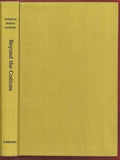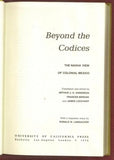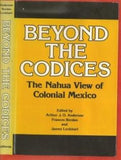Beyond the Codices: The Nahua View of Colonial Mexico
Author: Anderson, Arthur James Outram (1907-1996), Frances Berdan and James Lockhart [editors] from the library of Professor George M Foster
Year: 1976
Publisher: University of California Press
Place: Berkeley
Description:
ix+235 pages with facsimiles, appendixes and bibliography. Royal octavo (9 ¼” x 6 ¼”) issued in gold cloth with black lettering to spine. Translated and edited by Arthur J O Anderson, Frances Berdan and James Lockhart with a linguistic essay by Ronald W Langacker. From the library of George M Foster. UCLA Latin American Studies Series volume 27. 1st edition.
The main sources of classical Nahuatl studies have been splendid, elaborately illustrated documents fully deserving their status as “codices.” Their contents, often pre-Columbian in emphasis, are legends, annals, chronicles and poems. Few are aware that there is another vein of Nahuatl texts equal rich and very different, more embedded in post-conquest times, more reflective of the dynamics of social and cultural change. A mass of records concerning the everyday business of the Indian community of colonial Mexico exists in Nahuatl wills, land transactions, municipal council minutes, local tax records, and a rich variety of petitions and correspondence. This vast resource has been doubly out of the reach of the various disciplines – history, anthropology, linguistics – to which it would be of interest. Not only are the texts scattered and unpublished, but their forms and vocabulary are too unfamiliar to allow for their ready use. With the present selection of representative texts, transcribed, translated, and to some extent commented upon, the editors hope to draw attention to this second world of classical Nahuatl, and also provide a key with which scholars can open it up. Despite the initial difficulty, many of the records are standardized in the extreme, much like the Spanish one of which they are patterned and full understanding of a single model document will go far toward making other quickly comprehensible.
George McClelland Foster, Jr born in Sioux Falls, South Dakota, on October 9, 1913, died on May 18, 2006, at his home in the hills above the campus of the University of California, Berkeley, where he served as a professor from 1953 to his retirement in 1979, when he became professor emeritus. His contributions to anthropological theory and practice still challenge us; in more than 300 publications, his writings encompass a wide diversity of topics, including acculturation, long-term fieldwork, peasant economies, pottery making, public health, social structure, symbolic systems, technological change, theories of illness and wellness, humoral medicine in Latin America, and worldview. The quantity, quality, and long-term value of his scholarly work led to his election to the National Academy of Sciences in 1976. Virtually all of his major publications have been reprinted and/or translated. Provenance from the executor of Foster's library laid in.
Condition:
Foster’s stamp on front end paper. Jacket spine sunned, some small closed edge tears else a very good to fine copy in a better than very good jacket.
Kemper
Year: 1976
Publisher: University of California Press
Place: Berkeley
Description:
ix+235 pages with facsimiles, appendixes and bibliography. Royal octavo (9 ¼” x 6 ¼”) issued in gold cloth with black lettering to spine. Translated and edited by Arthur J O Anderson, Frances Berdan and James Lockhart with a linguistic essay by Ronald W Langacker. From the library of George M Foster. UCLA Latin American Studies Series volume 27. 1st edition.
The main sources of classical Nahuatl studies have been splendid, elaborately illustrated documents fully deserving their status as “codices.” Their contents, often pre-Columbian in emphasis, are legends, annals, chronicles and poems. Few are aware that there is another vein of Nahuatl texts equal rich and very different, more embedded in post-conquest times, more reflective of the dynamics of social and cultural change. A mass of records concerning the everyday business of the Indian community of colonial Mexico exists in Nahuatl wills, land transactions, municipal council minutes, local tax records, and a rich variety of petitions and correspondence. This vast resource has been doubly out of the reach of the various disciplines – history, anthropology, linguistics – to which it would be of interest. Not only are the texts scattered and unpublished, but their forms and vocabulary are too unfamiliar to allow for their ready use. With the present selection of representative texts, transcribed, translated, and to some extent commented upon, the editors hope to draw attention to this second world of classical Nahuatl, and also provide a key with which scholars can open it up. Despite the initial difficulty, many of the records are standardized in the extreme, much like the Spanish one of which they are patterned and full understanding of a single model document will go far toward making other quickly comprehensible.
George McClelland Foster, Jr born in Sioux Falls, South Dakota, on October 9, 1913, died on May 18, 2006, at his home in the hills above the campus of the University of California, Berkeley, where he served as a professor from 1953 to his retirement in 1979, when he became professor emeritus. His contributions to anthropological theory and practice still challenge us; in more than 300 publications, his writings encompass a wide diversity of topics, including acculturation, long-term fieldwork, peasant economies, pottery making, public health, social structure, symbolic systems, technological change, theories of illness and wellness, humoral medicine in Latin America, and worldview. The quantity, quality, and long-term value of his scholarly work led to his election to the National Academy of Sciences in 1976. Virtually all of his major publications have been reprinted and/or translated. Provenance from the executor of Foster's library laid in.
Condition:
Foster’s stamp on front end paper. Jacket spine sunned, some small closed edge tears else a very good to fine copy in a better than very good jacket.
Kemper











